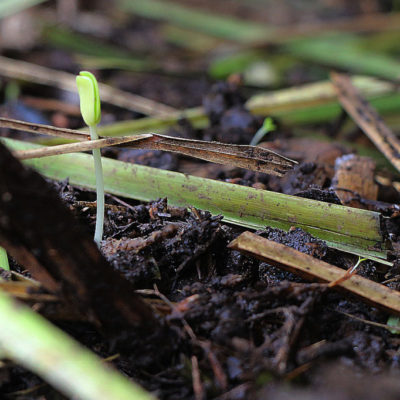
When land and gardens are poorly managed and soil is left uncovered, over tilled, and laden with natural and ago chemicals, the beneficial organisms die. What we have failed to understand is plants, bacteria and fungi have a signally system that will adjust for its’ own needs. When we force the pH and neglect and alter this language dance, the biology of the soil dissipates. This results in a poor quality soil that is unable to produce nutrient rich food. It is well recognised that soils are comprised of physical, chemical and biological properties. However, up until recently, there has been disproportionate attention given to the chemical and physical side of soils, without due respect given to the biological aspects. Even organic farmers and gardeners have unknowingly harmed the microbiome of the soil. Good news is we can reverse this with some understanding of what is going on in the soil food web.
Soil is a living, dynamic ecosystem comprising a complex diversity of life. This diversity is the basis of the fertility of our soil. Most of us actually have not experienced “food” that is fully alive and at its’ peak due to the biological infrastructure that created it. But, we are entering a new era of understanding soil as a function of it’s biology and about to understand the taste of nutrition.
Although chemical tests and geophysical analysis of soil are useful for certain circumstances and queries, biological analysis allows us to ecologically and effectively manage our agroecosystems. So how can we do this?
THE MAGIC OF LIFE UNDER THE MICROSCOPE
 Microscope soil tests give us a glimpse into the magical world of soil microbiology that has previously been very abstract and difficult to interact directly with. You are able to see the fungi, protozoa, bacteria and nematodes that play such a vital role in the health of your soil with (relative) ease.
Microscope soil tests give us a glimpse into the magical world of soil microbiology that has previously been very abstract and difficult to interact directly with. You are able to see the fungi, protozoa, bacteria and nematodes that play such a vital role in the health of your soil with (relative) ease.
Analysing your soil in this way will allow you to:
- Analyse the quality of your compost/ compost tea
- Analyse compaction and anaerobic conditions
- Find out about diseases before they become a problem
- Find out about changes in your soil and how effective your techniques are
Analysing your soil can be as simple as bringing a sample to our lab for a look down the microscope. This gives us the information to figure out what management techniques are needed, which can then be administered and adjusted accordingly.
Analysing your soil in this way is efficient, effective and helps you to get more in touch with the biology in your own soils, enabling a deeper understanding of soil functioning. And, crucially, knowledge of your soil will empower you to make the right decisions for you, instead of being dependent on third parties that may not have your best interests at heart.
It is time we view and treat soil as a living being- in a traditionally regenerative manner – more biological activity is present., more biological activity is introduced. When organic matter is present, the soil can thrive and become the rainbow under our feet now and for generations to come.
